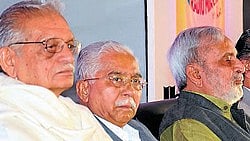
File photo of Gulzar, Chandrashekhara Kambara, U R Ananthamurthy at Bangalore Literature Festival at Jayamahal Palace in Bangalore.
Credit: DH Photo/ S K Dinesh
I was honoured to attend the grand ceremony where Dr Chandrashekhara Kambara was conferred with the prestigious Fellowship of the Central Sahitya Akademi, its highest honour, in recognition of his eminence as a Kannada writer, scholar, poet, playwright, folklorist and film director.
As an invitee and admirer of the written word, I felt proud to witness this momentous occasion, where a writer of his calibre receives the recognition he deserves.
Few writers and poets ‘find magic in the mundane, pause to marvel at a sunset, feel a surge of awe at a sky ablaze with stars, and find solace in the quiet beauty of a full moon’. And there are those who find their muse in the soil of their land, in the people around, and in life experiences – their literary work becomes a tapestry woven with the threads of a deep understanding, empathy, questioning, reasoning and hope. Kambara belongs to the latter group, and his literary works are a testament to his deep understanding, empathy, questioning, reasoning and hope. His impressive corpus includes 25 plays, 11 poetry collections, 5 novels, 16 research works and numerous scholarly articles on folk theatre, literature and education.
A strong advocate of mother tongue--Kannada in the case of Karnataka--for education, Kambara argues that only one’s native language can provide the “experience” necessary for true learning, whereas learning through another language yields mere “information”.
This concurs with UNESCO’s recommendation that “providing education in a child’s mother tongue is a critical issue.” He understands the importance of it, as from an early age, Kambara was interested in folk arts, local culture and rituals and was proud of them.
His grand vision of Kannada literature and Karnataka culture is reflected in his deep commitment to build the Kannada University at Hampi as its founder vice-chancellor. The architecture; the choice of the subjects that cover the diverse variety of cultures and society of Karnataka; faculty and academic activities show Kambara’s native vision, which had evolved in his literary works for decades.
We must be grateful to Jagadguru Siddaram Swamiji of Savalagi Matha, who recognised the genius in Kambara and took care of all his primary and high school education expenses – or else the literary brilliance of this stalwart may have got snuffed out as a school dropout due to poverty. What a loss it might have been! The same student, with the right timely support, earned his PhD from Karnatak University, Dharwad.
He taught at the University of Chicago for a short while and taught at Bangalore University for over two decades and was also a ‘Fulbright Scholar’. He served as the President of Sahitya Akademi and as the Chairman of the National School of Drama Society, New Delhi. Such coveted positions.
In one of the literary meetings organised by Sahitya Akademi, I had the privilege to share the dais with him… And I earnestly thank my muse for it!
Disclaimer: The views expressed above are the author's own. They do not necessarily reflect the views of DH.